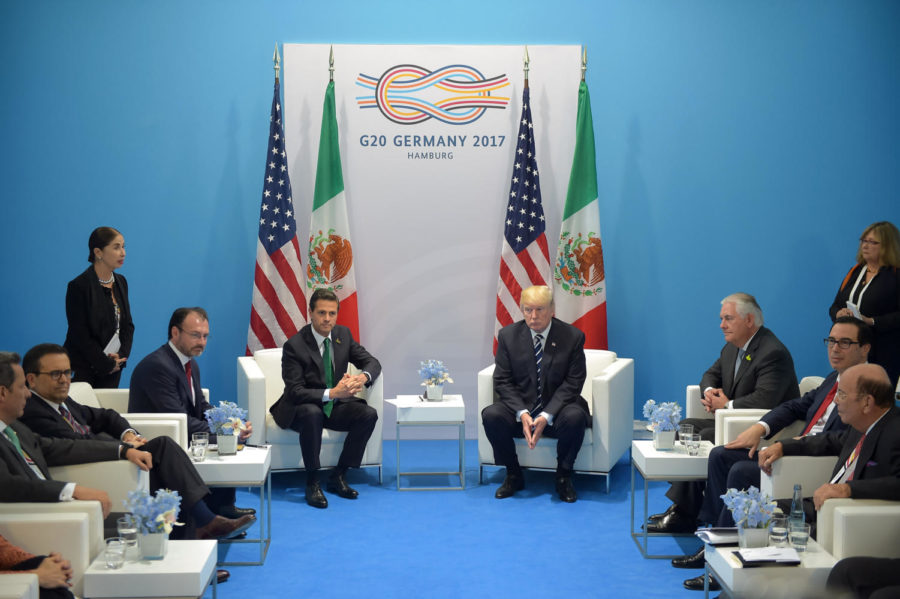Trump announces trade deal between Mexico and United States
Trump and Mexican President Enrique Peña Nieto talk at the G20.
August 27, 2018
A bilateral trade agreement between Mexico and the United States was reached Tuesday, bringing the United States closer to a new agreement President Trump hopes can replace the North American Free Trade Agreement (NAFTA).
“They used to call it NAFTA,” Trump said in a statement from the Oval Office. “We’re going to call it the United States-Mexico trade agreement. We’re going to get rid of NAFTA because it has a bad connotation.”
While Trump says NAFTA will be nixed, associate professor of economics Chad Hart said “it’s a little more complicated than what the president laid out today.”
“The United States and Mexico have come to an agreement that will be part of NAFTA, or whatever new NAFTA will be,” Hart said. “So that is an agreement that could be signed between the U.S. and Mexico. At the same time, they will be reaching out to Canada to rejoin discussions for NAFTA 2.0.”
If Canada does not agree to join quickly, Hart said Trump will likely move on without Canada.
“President Trump has indicated that he would be comfortable in doing that,” Hart said. “Mexico, on the other hand has always said that this is a part of a broader trade deal between the three countries. That is why this isn’t as simple as Trump laid out: It probably won’t be as narrow of a deal as Trump is saying it is as Mexico and Canada don’t want that.”
In the case a second bilateral deal between the United States and Canada or a recommitment to a trilateral agreement like NAFTA is not made, Hart says there would be large economic consequences for the Midwest.
“There could be stronger trade barriers between the U.S. and Canada,” Hart said. “When you look at it from an agricultural perspective, Canada is just about as large of a market, in dollar terms, as China is; both countries are worth about $20 billion in agriculture trade, so that would be a big deal.”
Hart said NAFTA was able to put the three agricultural markets of Canada, the U.S. and Mexico under one agreement, and if this new deal included all three countries, there would be little impact on agricultural markets.
“There aren’t a lot of implications for agriculture, but the deal does change a lot for automobile manufacturing,” Hart said. “A large portion of the provisions have to do with manufacturing, more specifically automobile manufacturing. The ag trade side of this agreement looks very similar to what we had before.”
The deal Mexico and the United States came to will make it so 75 percent of components in the auto manufacturing process will have to be from North America to qualify inside of the free trade deal.
The trade deal’s focus on auto manufacturing is why Canada took a step back Hart said.
“The trade issues regarding automobile manufacturing are primarily an issue between the United States and Mexico,” said Hart. “When that became the focus about three months ago is when Canada left the negotiations.”
When reached for comment the Iowa Farm Bureau reflected the opinion of what Farm Bureau Federation president Zippy Duvall said in a press release.
“Farmers and ranchers are ready to move forward on trade with our nearest neighbors,” Duvall said. “Farm Bureau is excited about this announcement and will review the details of the Mexican trade deal as they become available. Based on the gains both sides have seen with NAFTA, we expect this new ‘U.S.-Mexico Preliminary Agreement in Principle’ to build on that success for our farmers and ranchers.
“No trade deal is perfect, however,” the press release says. “There is room for improvement, especially in provisions that affect U.S. fruit and vegetable growers, and we will continue to call for a resolution to those issues and a final deal that works for all of agriculture.”
James McCormick, professor of political science at Iowa State, said Canada is likely to re-enter the negotiations now that progress is being made between the United States and Mexico.
McCormick said apparent trade deficits and job losses are why Trump had originally seen an issue with NAFTA, but was unsure if the deal would solve or improve those issues.
“I would have to see more of the specifics of the deal,” McCormick said. “From what I can tell, this deal is preliminary and still a long way off.”
Hart had similar comments on how far out the changes were from completion.
“Just because a meeting has been reached, doesn’t mean that it will go into effect,” Hart said. “This will have to pass both the United States legislature and then the Mexican legislature before it will be official. By the time that happens Canada will likely be a part of the deal so they would have to pass it as well. This is just the first step towards a new agreement.”
Hart said it is likely that the United States, Canada and Mexico will probably begin joint negotiations within the next two months.







